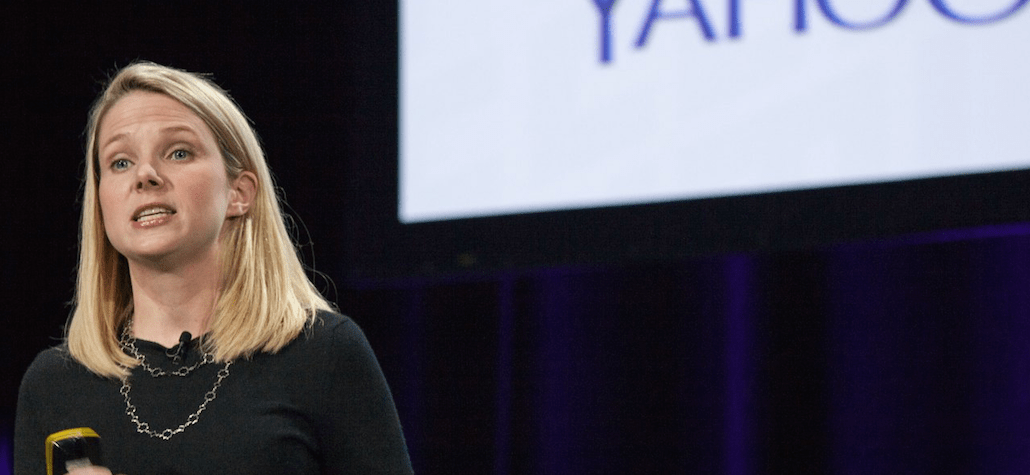Save 50% on a 3-month Digiday+ membership. Ends Dec 5.

When it comes to the ad business, Yahoo CEO Marissa Mayer has had a rough go of it. First she hired the haughty Henrique de Castro to handle relations with Madison Avenue. That was a disaster. Then she famously slept through a meeting with Interpublic Group. That didn’t impress. Finally, she’s seen Yahoo’s display ad business shrink since she took over. Not great.
Mayer’s latest comments calls into question whether she believes in programmatic advertising as a key part of her plan to revive Yahoo. During an interview at Fortune’s Most Power Women dinner last night, she dismissed AOL as very different from Yahoo because of AOL’s heavy focus on advertising technology, not just on AOL properties but across the Web.
Some people on the outside saw similarities between the companies, we didn’t really. AOL made a big bet on programmatic advertising, where we’re really making our bets on mobile, video, native, social. There was some overlap in the video space. But overall I would say that in my view we were taking the ads into a slightly different space with native. And also, it’s really important to me that we maintain a brand and a relationship with our users. That we’re not simply helping other sites monetize. That we actually are providing services to end users that they really value, that they continue to turn to Yahoo to inform, connect, entertain, etc.
That raised some eyebrows around the industry. Programmatic advertising is nearly by acclaim considered a key part of future media monetization. Under Mayer, Yahoo has pinned its hopes on a “mavens” — mobile, video, native, social — strategy. Yahoo has long had a problem of not making as much money as it could off its own inventory. Mayer could be simply acknowledging that fact. After all, that was the hope in buying Right Media, allowing Yahoo to use programmatic ad tech to make more money off its own ad space.
“I don’t see mobile and video and native and programmatic as being mutually exclusive,” said Bryan Wiener, chairman of digital shop 360i. “I see them as being complementary.”
There’s also a question of strategy. “Simply helping other sites monetize” is what made Mayer’s former employer Google a media juggernaut. Ad networks, and now programmatic ad platforms, are considered essential to modernizing the practice of placing relevant, effective ads across a fractured digital media landscape. The combination of “owned and operated” properties and a network has been the foundation of just about every successful Internet advertising business.
Mayer, though, doesn’t appear to believe that’s critical to what Yahoo is. At the start of her interview, here’s how she described Yahoo’s core mission:
One of the things that we did is we first got in there and started thinking about what we wanted Yahoo to be. It was clear that it’s news, it’s sports scores, it’s stock quotes, it’s mail, it’s search.
Sorry, ad tech.
But as Undertone co-founder Eric Franchi points out, Yahoo operates the second largest ad network on the Web, according to comScore. It owns Right Media, which many thought Yahoo would mothball after Mayer took over, but which Mayer then endorsed. And just this past November, Yahoo shelled out $640 million for BrightRoll, a platform for placing video ads across the Web. Yahoo is also making an aggressive push to put its spin on native ads, paired with content recommendations, on third-party sites. Add that together, and it’s a lot of “helping other sites monetize.”
“They’re de-emphasizing ad tech/ad network from the core strategy,” said Franchi in an email. “But I don’t expect them to throw in the towel. First, every big digital revenue player — Google, Facebook, Twitter, LinkedIn, Amazon, AOL — has a network or exchange. It’s how you scale. Second, Yahoo, by virtue of Mail, is one of the few players who has first-party login data. And in the age of mobile and no cookies, that’s a valuable asset.”
Ad position: web_incontent_pos1
These comments were perhaps offhand, but they also could signal that Mayer is more interested in building breakthrough products than she is in the nitty-gritty of building ad tech systems to compete with Google and Facebook.
More in Media

What publishers are wishing for this holiday season: End AI scraping and determine AI-powered audience value
Publishers want a fair, structured, regulated AI environment and they also want to define what the next decade of audience metrics looks like.

Digiday+ Research Subscription Index 2025: Subscription strategies from Bloomberg, The New York Times, Vox and others
Digiday’s third annual Subscription Index examines and measures publishers’ subscription strategies to identify common approaches and key tactics among Bloomberg, The New York Times, Vox and others.

From lawsuits to lobbying: How publishers are fighting AI
We may be closing out 2025, but publishers aren’t retreating from the battle of AI search — some are escalating it, and they expect the fight to stretch deep into 2026.
Ad position: web_bfu